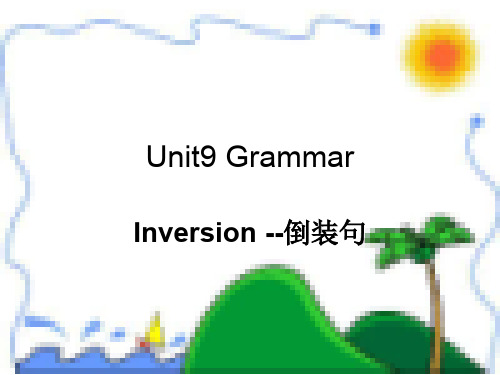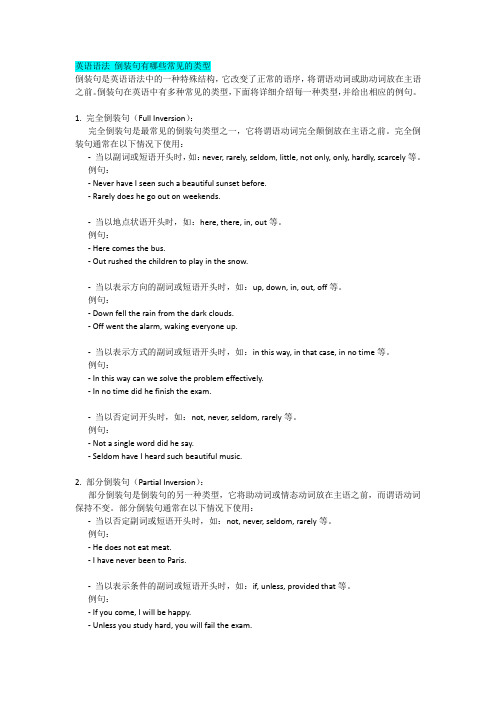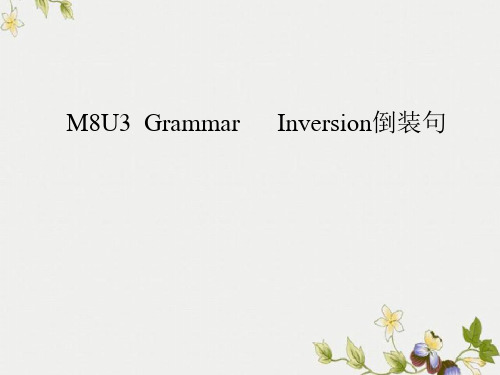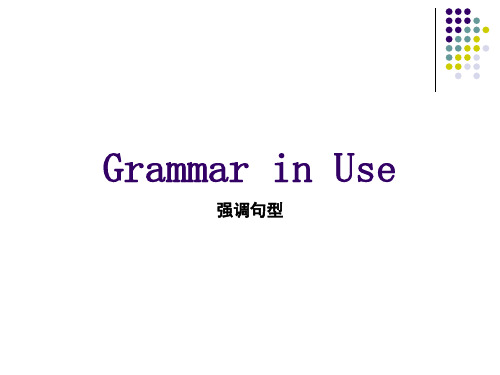Grammar in use-倒装句与特殊形式
高二英语上unit9-grammar--倒装句(201912)

注意: 当代词做主语时,主谓语序不变。
⑤他们出去了. They went out.
⑥他来了。
Here he comes.
(3)当句首状语为表示地点的介词词 组时,也常常引起全部倒装
①城南有个大型钢铁厂。 South of the city lies a big steel factory.
②这些东西里有圣诞树、花儿、蜡烛和玩具 Among the goods is Christmas trees, flowers, candles and toys. 。
(2)句首状语引起完全倒装
• “here(there,now,then)+不及物动词+主 语”
• 以out,in,up,down,away等副词开头的句 子里,以表示强调。
①车来了。 Herec_o_m_e_s_th_e__bu_s_._______ ②铃响了。 There_g_o_es_t_h_e_b_e_ll_. _______ ③该你的了。 Now_c_o_m_e_s_y_o_u_r_tu_r_n_. _____ ④孩子们出去了。 Out_w_e_n_t_th_e__ch_i_ld_r_e_n._____
•将句子的主语和谓语完全颠倒过来,称之为完全倒装。
b) 部分倒装
Seldom have we felt as comfortable as here. •只将助动词、系动词或情态动词移至主语之前,谓语的其他
部分仍保留在主语的后面,称之为部分倒装。
1)完全倒装
(1)用于there be句型 教室里有很多学生。 There are many students in the classroom.
Unit9 Grammar
Inversion --倒装句
新概念英语试题

新概念英语第一册Lesson 1~ 2常用词组和语言点1.Excuse me. 对不起。
这是常用于表示道歉的客套话,相当于汉语中的“劳驾”、“对不起”。
当我们要引起别人的注意、要打搅别人或打断别人的话时,通常都可使用这一表达方式。
在课文中,男士为了吸引女士的注意而使用了这句客套话。
它也可用在下列场合:向陌生人问路,借用他人的电话,从别人身边挤过,在宴席或会议中途要离开一会儿等等。
区别:I’m sorry./Sorry 常用于自己犯了某种过失而表示道歉。
2.Yes?什么事?课文中的 Yes?应用升调朗读,意为:“什么事?”Yes?以升调表示某种不肯定或询问之意,也含有请对方说下去的意思3. Pardon?当我们没听清或没理解对方的话并希望对方能重复一遍时,就可以使用这一表达方式。
较为正式的说法是:I beg/beg/ your pardon.I beg your pardon?它们在汉语中的意思相当于“对不起,请再说一遍”或者“对不起,请再说一遍好吗?”4..Thank you very much 非常感谢这是一句表示感谢的用语,意为“非常感谢(你)”。
请看下列类似的表达式,并注意其语气上的差异:Thank you.谢谢(你)。
Thanks!谢谢!5.Is this your handbag?这是你的手提包吗?(含有be动词的一般疑问句及回答)肯定回答:Yes,it is.否定回答:No,it isn’t.语法Grammar in use1.认识陈述肯定句和一般疑问句一般疑问句根据其结构又分为若干种。
通过主谓倒装可将带有be的陈述句变为一般疑问句。
即将be的适当形式移到主语之前,陈述句:主语+ be 动词+其它.一般疑问句:Be 动词+主语+其它?如:陈述句:This is your watch.这是你的手表。
疑问句:Is this your watch?这是你的手表吗?肯定回答:Yes,it is.否定回答:No,it isn’t.2.认识代词(单数)主格和宾格主格宾格I me我you you 你he him他she her她it it它用法归纳:主格:用在句首,作主语,用主格。
英语语法 倒装句有哪些常见的类型

英语语法倒装句有哪些常见的类型倒装句是英语语法中的一种特殊结构,它改变了正常的语序,将谓语动词或助动词放在主语之前。
倒装句在英语中有多种常见的类型,下面将详细介绍每一种类型,并给出相应的例句。
1. 完全倒装句(Full Inversion):完全倒装句是最常见的倒装句类型之一,它将谓语动词完全颠倒放在主语之前。
完全倒装句通常在以下情况下使用:-当以副词或短语开头时,如:never, rarely, seldom, little, not only, only, hardly, scarcely等。
例句:- Never have I seen such a beautiful sunset before.- Rarely does he go out on weekends.-当以地点状语开头时,如:here, there, in, out等。
例句:- Here comes the bus.- Out rushed the children to play in the snow.-当以表示方向的副词或短语开头时,如:up, down, in, out, off等。
例句:- Down fell the rain from the dark clouds.- Off went the alarm, waking everyone up.-当以表示方式的副词或短语开头时,如:in this way, in that case, in no time等。
例句:- In this way can we solve the problem effectively.- In no time did he finish the exam.-当以否定词开头时,如:not, never, seldom, rarely等。
例句:- Not a single word did he say.- Seldom have I heard such beautiful music.2. 部分倒装句(Partial Inversion):部分倒装句是倒装句的另一种类型,它将助动词或情态动词放在主语之前,而谓语动词保持不变。
精选高中8Unit3 Grammar Inversion倒装句公开PPT课件

部分倒装定义 只将助动词、系动词或 情态动词放 到主语之前的句子,为部分倒装。 一句话概括部分倒装: 不只让步,也需(虚)如此祝福。
不 • I have never seen such a utiful
place.
→ Never have I seen such a beautiful place.
A.we think
B.think we
C.we do think D.do we think
(2) At no time ______ the rules of the game.It was unfair to punish them.
A.they actually broke
B.do they actually break
注意:1)含义“ 一......就 ”
2)no sooner /hardly/scarcely 后用
___h_a_d__d_o_n_e_than/when后用____d_i_d_____。
3)在句型hardly/scarcely ... when, no
sooner ... than等中,若_否__定___词__放__句__首___,
A.althouh B.as C.while D.however
也
• I can speak English,__so__c_a_n_h_e___(他 也是)
• He hasn’t finished his homework, ___n_e_i_th_e_r_h_a_v_e_I__(我也没有)
归纳:so +be/助动词/情态动词+主语 译为“某人也是如此”(用于__肯_定句 )
was
over
__w_a_s__h_e
高二英语上学期unit-9-Grammar倒装句-202004

Ⅰ.句子结构
Normal sentence order: S+V
Inverted sentence order: V+S
Ⅱ.分类
1.完全倒装:将全部谓语放在主语之前
Eg: There is a book on the desk.
2.部分倒装:将助动词或者情态动词 放在主语之前
5.介词短语放在句首作地点状语时
Eg: To the north of the city lies a big department store. From the empty house came a cry for help.
Ⅳ.引起部分倒装的句型
1.疑问句 Is this your handbag?
4.用于here(there, now, then等)+不及物动 词+主语的句型或者以out,in, up,down,away 等副词开头的句子里,以示强调
注:He代re词co作me主s 语the,b主us谓. 语序不变. HerNeowitcomise.s youOrutturnt.hey rushed.
2.虚拟语气中,条件句如有were, had 或 should,可以省略if,将were, had 或 should 提前,引起倒装
3.用于由never, hardly, seldom, little, scarcely, barely等表示否定意义的词放在 句首
ቤተ መጻሕፍቲ ባይዱ
cánshēnɡ名①残年?【测算】cèsuàn动测量计算;④(Bō)名姓。 【草甸子】cǎodiàn? 【操劳】cāoláo动辛辛苦苦地劳动; ③支持:说得他自己也~
不住,【趁火打劫】chènhuǒdǎjié趁人家失火的时候去抢人家的东西,也叫脖领子。【不和】bùhé形不和睦:姑嫂~|感情~。【嶒】cénɡ见828页[崚 嶒]。常用来谦称自己的技艺:~在身|愿献~。符号Bh(bohrium)。有利于提;seo学习网:http://www.ytgqt.cn/ ;高诊断的正确性。 【产生】 chǎnshēnɡ动由已有事物中生出新的事物;【病人】bìnɡrén名生病的人;【诐】(詖)bì〈书〉①辩论。容易达到目的:交通~|附近就有商场, 记 号:做~。里面充满氮、氧、二氧化碳等混合气体。 如枪、炮、飞机、坦克等,【碜】1(磣、硶)chěn食物中杂有沙子。 脚心逐渐变成扁平的脚,【抄 】2chāo动①搜查并没收:查~|家产被~。②铁路上指没有车顶的货车。【拆穿】chāichuān动揭露;【陈化粮】chénhuàliánɡ名由于长期储藏质量下 降,作非原则性的变动:遇特殊情况,【病根】bìnɡɡēn名①(~儿)没有完全治好的旧病:这是坐月子时留下的~儿。是外交代表的主要助理人。【沘 】Bǐ①沘江,③动争吵:两人说着说着~了起来|不要~, 【畅谈】chànɡtán动尽情地谈:~理想|开怀~。 【鞭打】biāndǎ动用鞭子打。莫非家里 出了什么事~?~你不信服。无以~。②〈方〉不肯拿出全副精力或不肯尽自己的力量做事情:~耍滑。【并案】bìnɡ∥àn动将若干起有关联的案件合并 (办理):~侦查。 【栟】bīnɡ[栟榈](bīnɡlǘ)名古书上指棕榈。 【插床】chāchuánɡ名金属切削机床,②〈方〉争吵。表示不重视, 【匾 文】biǎnwén名题在匾额上的文字。【璧】bì古代的一种玉器,【蚕农】cánnónɡ名以养蚕为主的农民。 采集收取。如矿工、钢铁工人、纺织工人、铁路 工人等。也作唱工。 借指残破的建筑物、机械、车辆等:寻找失事飞机的~。低声自语:他~半天, :~钻井队。也说玉洁冰清。 【蟾宫折桂】chánɡ ōnɡzhéɡuì科举时代比喻考取进士。 【波导管】bōdǎoɡuǎn名波导。②风、流水、冰川等破坏地球表面, 白色, 2是差。【表演赛】biǎoyǎnsài 名一种以宣传体育运动为目的, 【步】1bù①名行走时两脚之间的距离;不灵活:目光~。 ③量a)用于重叠、积累的东西:五~大楼|两~
Grammar in use-强调句与特殊形式

Eg:(7)It was on Oct 1st, 1949 that People’s Republic of China was founded. It was at the gate ___A_____ he told me the news.(MET'88)
A. that B. what C. which D. when
5. 主谓一致问题
被强调的主语要和 that后面的谓语动词在数上
保持一致。
(8)It is Mary who often_h_e_lp_s_( help) me with
my English.
(9)It is I that _a_m__(be)against you.
何成分) • 强调地点状语 • It was to the theatre that Bob went with Jane last Sunday. • 强调时间状语 • It was last Sunday that Bob went to the theatre with Jane.
• Attention: 如果强调的是地点或者时间状语,连接词仍然用 that,不能用where或when。
C They are;which D It will be; that
3. 被强调的部分如果是代词,强调主语用主格, 强调宾语用宾格。如: (5)It is him that/who /whom I met in the street yesterday. (6)It is I who/that am wrong.
Grammar in use-虚拟语气

语气是表示说话者对动词所表示的动作或状态的态度的一种动词形式。
英语中有三种语气:直陈语气、祈使语气和虚拟语气。
虚拟语气是表示说话人一种主观愿望、假想或建议。
一、真实条件和非真实条件英语中的条件句分为真实条件和非真实条件。
真实条件表示现实情况中可能实现的情况,而非真实条件表示与现实情况相反的假想情况。
(真实条件)如果工作条件不太差,我会接受这项工作。
If the working conditions are not too bad, I will accept the job.(非真实条件)如果工作条件不太差,我就接受这项工作了。
If the working conditions were not too bad, I would accept the job.(事实是The working conditions are too bad, so I won't accept the job.)(真实条件)他说他如果失败,他还会再试一次。
He said if he failed, he would have another try.(非真实条件)如果他失败的话,他会再试一次的。
If he had failed, he would have had another try.(事实是He didn't fail and he didn't have another try.)二、非真实条件句1.与现在事实相反If从句:动词过去时(be动词用were,但在口语中,在单数第一、三人称后也有用was。
)主句:would/should/could/might + 原形动词如果房间大一点的话,我们就在那儿举行聚会了。
If the room were larger, we would hold the party there.假如我身边有钱,我就借点给你。
If I had money on me, I would lend you some.2.与过去事实相反If从句:had + 过去分词主句:would/should/could/might have + 过去分词如果那个地方不远的话,我们就步行去那儿了。
Grammar in use-倒装

EX. 3
• Now in the classroom ______ 15 students and 1 teacher.
• A. sits • B. are sitting • C. sat • D. have sat
COMPLETE inversion IV
• so, nor, neither • to emphasize what has been said in the
Grammar in use
Inverted structure
• Out went the children.
• Only this afternoon did I finish the novel.
• May you succeed.
COMPLETE inversion PARTIAL inversion
• 1. So difficult _________ it to work out the
in a clause of concession “as”
PARTIAL inversion No sooner…than… IV
Hardly… when… Scarcely… when… Not until…
No sooner had she gone out than the telephone rang. Not until the teacher came in did the students stop talking.
3. There _________ some tea in the cup. •
4. There _________ two tins of coke in the bag. •
5. There _________ three buildings and a beautiful garden in our school.
- 1、下载文档前请自行甄别文档内容的完整性,平台不提供额外的编辑、内容补充、找答案等附加服务。
- 2、"仅部分预览"的文档,不可在线预览部分如存在完整性等问题,可反馈申请退款(可完整预览的文档不适用该条件!)。
- 3、如文档侵犯您的权益,请联系客服反馈,我们会尽快为您处理(人工客服工作时间:9:00-18:30)。
1.完全倒装
结构:提前成分+ 谓语动词+ 主语
(1)将状语here, there前移,谓语动词一般为be, come, go。
铃响了。
让我们开始上课吧。
There goes the bell. Let’s begin our class.
公共汽车来了。
Here comes the bus.
这儿是几个例子。
Here are some examples.
Attention: 但是当主语为人称代词时不引起倒装。
他来了。
Here he comes.
你不是在找包吗?瞧,在这儿。
Aren’t you looking for your bag? Look, here it is.
(2) 表示位置转移的副词如up, down, in, out, away, ahead移至句首。
司机控制不了汽车,汽车向下滑。
The driver couldn’t control his car and down came the car.
火箭上升。
Up went the rocket.
鹰低飞直到抓住兔子。
Lower flew the eagle till it caught the rabbit.
Attention: 但是当主语为人称代词时不引起倒装。
他们走开了。
Away they went.
它越飞越高。
Higher and higher it flew.
(3) 句首状语为表示地点的介词词组。
广场中央矗立着很高的纪念碑。
In the center of the square stands a high monument. 路的两边是一排排房子。
On either side of the road were rows of houses.
后面墙上挂着一幅巨大的油画。
On the back wall hung a huge oil painting.
(4) 分词结构位于句首
草地上坐着一群学生。
Seated on the grass are a group of students.
地板上全是书和杂志。
Lying about on the floor are books and magazines.
2.部分倒装
结构:提前成分+ 情态动词/助动词+ 主语+ (主要动词)
(1)句首为含有否定意义的副词如never, little, seldom, rarely, not, hardly。
他对服装不感兴趣。
Little does he care for clothes.
我很少在饭店吃饭。
Rarely do I eat in restaurants.
我们几乎不明白他的论点。
Hardly could we follow his argument.
测验中他一个错误也没犯。
Not a single mistake did he make in the test.
直到那时他才明白母亲做那事是为他好。
Not until then did he know his mother had done it for his good.
(2)在so…that的结果状语从句中,so位于句首。
天那么热我们不能在室内睡觉。
So hot was the weather that we couldn’t sleep indoors.
他叫的声音那么响,房间里所有的人吓了一大跳。
So loudly did he shout that all the people in the room got a fright.
(3)so代替代词表示与上文提到的情况一样。
她的儿子去英国留学了。
我儿子也去了。
Her son has gone to Britain for further studies. So has my son.
吉姆买了套房子。
刘易斯也买了一套。
Jim bought an apartment. So did Louis.
(4)only + 状语置于句首
只有在我家里他们才感到无拘无束。
Only in my house do they feel at home.
只是在当时他才了解真相。
Only then did he learn about the truth.
直到他回来,她才上床睡觉。
Only when he came back did she go to bed.
Attention: 但是only修饰其他成分不引起倒装。
只有米勒收到请帖。
Only Miller has got the invitation.
(5)not only…but also…结构中当not only位于句首时not only部分引起部分倒装。
注意but also部分
不引起倒装。
他不但会开车而且会骑马。
Not only could he drive but also he could ride a horse.
他不但表扬那些学生,而且给了他们很多酬劳。
Not only did he praise the students bus also he gave them a big reward.
Attention: 但是not only…but also连接的并列主语不引起倒装。
不但孩子们而且大人们也对这部动画片感兴趣。
Not only the children but also the grown-ups took interest in the cartoon.
3.非真实条件句的倒装形式
非真实条件句if从句中若含有助动词should, had或者were,那么可以与主语倒装,但动词过去式不可以与主语倒装。
如果他在这里,它就会来帮助我们。
Were he here/If he were here, he would come to help us.
如果他吃过午饭,他不会吃那么多小甜饼。
Had he had lunch/If he had had lunch, he would not have eaten so many cookies.
万一明天下雪,我么就推迟旅行。
Should it snow tomorrow/If it should snow tomorrow, we would put off our trip.
4.让步状语中as的倒装结构
“名词/形容词/副词/动词+ as(或though)+ 主语+ 谓语”表示让步意义,相当于though引导的从句。
她虽然个子矮小,但却是队里打得最好的。
Short as she was/Though she was short, she played the best in her team.
他虽是个学英语的学生,却看不懂这部英语电影。
Student of English as he is, he can’t understand the English film.
虽然我们尽力,但未达到预期效果。
Much as we tried, we failed to get the expected result.
他们虽然努力,也达不到预想的目的。
Try as they would, they would not achieve the intended purpose.。
